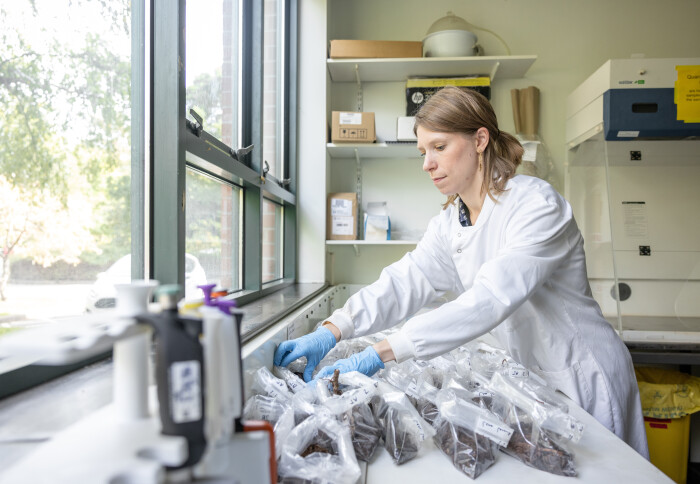£2.45 million gift launches novel research to sustainably increase crop yields

Imperial researchers are testing soil microbial communities to protect ecosystems thanks to a £2.45 million donation from the Michael Uren Foundation.
This research aims to address one of greatest challenges facing humanity: how to feed the world’s growing population without destroying natural ecosystems. Continued agricultural expansion is the major driver of natural habitat loss, which in turn is triggering a biodiversity crisis and the sixth mass extinction event in the history of the planet. There is a need for agricultural intensification to produce more food from the same quantity of land; but pesticides, fertilisers and the genetic modification of crops can be bad for human and environmental health.
Microbes, the second-most abundant organisms on Earth (after plants), constitute the majority of biodiversity on Earth and control the flows of nutrients and energy within and between organisms. Recent studies have shown that certain soil microbes can suppress crop diseases, either by competing for food with them, or directly inhibiting their growth. However, past attempts to treat crops with individual strains of beneficial microbes have been ad hoc and limited in scope and scale.
“We are pioneering a new way of approaching agriculture, environmental management and biodiversity improvement...to deliver solutions that can make a difference on a global scale.” Dr Bonnie Waring Senior Lecturer in Ecosystems Ecology
Previous research by Imperial academics has shown that altering the entire soil microbial community (also known as the ‘soil microbiome’) can have better outcomes in comparison with single-strain alterations. Previous work has shown that taking soil microbiomes from one host and transplanting them into another can enhance the survival of tree seedlings or the health of pollinators. And now these researchers have proposed a groundbreaking strategy to further develop their research, enabling farmers to reliably conduct microbial interventions at the larger scales necessary for agriculture and ecosystem restoration.
The late Sir Michael Uren was a proud Imperial alumnus (Mechanical Engineering and Motive Power, 1943) and remains the College’s most generous benefactor. The Trustees of the Michael Uren Foundation say: “We are proud to continue Sir Michael Uren’s legacy of philanthropy at Imperial and the Foundation is active in supporting initiatives that preserve and enhance the environment. Dr Bonnie Waring’s project has the potential to protect biodiversity and deliver food security to communities all over the world, and we are excited to support this groundbreaking research.”
Harnessing microbial life in soils to sustain ecosystems
Led by Dr Bonnie Waring, Senior Lecturer in Ecosystems Ecology at Imperial, this work will build on an exciting and rapidly developing new field of research demonstrating that complex communities of bacteria, fungi and viruses – the ‘microbiome’ – control the functioning of organisms and ecosystems. Dr Waring will be supported by a project team with extensive knowledge across microbiome sciences, soil ecology and plant-microbe interactions.
“My project team has one ultimate goal: to help farmers optimise soil microbiomes on their own farms, tackling serious crop diseases and enhancing the sustainability of their operations,” says Dr Waring. “To do this, we will focus on optimising whole soil microbiomes to suppress crop pathogens. Our hypothesis is that disease suppression through the collective actions of complex microbiomes is an effective solution to maximise crop yields while minimising chemical inputs.
“We are pioneering a new way of approaching agriculture, environmental management and biodiversity improvement, making use of emerging technologies to develop and deliver solutions that can make a difference on a global scale.”
The project will begin during the 2023/24 academic year, and will last for three years. The Michael Uren Foundation’s philanthropic gift will largely be used to hire five post-doctoral research associates (PDRAs) and two research technicians to carry out the work, and will enable lead academic staff to contribute to the project.
Insights from the project team’s research will inform the creation of a digital toolkit to design efficient microbiomes, for improved land management worldwide.
From lab to land: Silwood Park’s unique capabilities
This research will be carried out at Silwood Park, Imperial’s rural campus situated near Ascot in Berkshire and one of Britain’s foremost centres for research and teaching in ecology, evolution, and conservation. Here, the project team can draw upon the expertise and facilities on offer to test and refine this novel approach from lab to field, developing solutions that are ready for translation into real-world impact.
Imperial is currently developing the Silwood Park Campus as a new hub for research and innovation in ecology and planetary health, in response to critical challenges related to climate, environment and sustainability. Here, we will draw together expertise from across the College, connecting engineers, medics, scientists and business leaders to make rapid scientific progress and to deliver the innovation so urgently required, particularly in the developing world.
Professor Richard Craster, Dean of the Faculty of Natural Sciences, says: “The Silwood Park Campus is uniquely equipped to realise this vision, with its combination of vast grounds for field trials and state-of-the-art laboratories for climate-controlled growth and genomic research. Unlike other institutions, where researchers often face the disruption of relocating for field trials, Silwood accommodates both fundamental laboratory work and large-scale field trials on a single site. This seamless pathway from discovery to impact fosters innovation and accelerates progress.
“We are incredibly grateful to the Michael Uren Foundation for their transformational gift. Because of their support, we are able to accelerate efforts to address complex problems that require immediate attention, maximising our capacity for greater impact.”
Article text (excluding photos or graphics) © Imperial College London.
Photos and graphics subject to third party copyright used with permission or © Imperial College London.
Reporter
Isabel Overton
Advancement